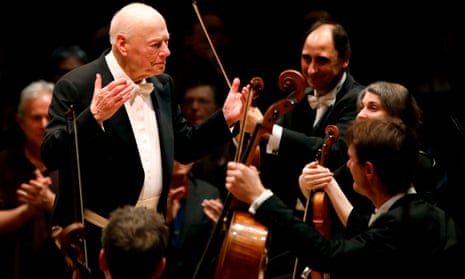As befits a man of 90, Bernard Haitink walks more uncertainly to the rostrum these days. But, once he raises his baton, the years fall away. Haitink conducted the London Symphony Orchestra for nearly two hours in this first of two Barbican concerts to mark his latest significant birthday. Yet, even at 90, he still stood to conduct for long periods, including the whole of the first movement of Bruckner’s Fourth Symphony, the gestures unfailingly crisp and relevant, and the clarity of the music-making never faltering.
It was typical of the self-effacing side of Haitink that he began the evening by ceding the limelight to the Viennese pianist Till Fellner, in Mozart’s E flat Piano Concerto, K482. Yet there was no attention-seeking anywhere in this collaboration. Fellner played with studied simplicity rather than the glittery show that this dazzlingly varied score might seem to require, while Haitink showed why he has always been such an attentive accompanist – an underrated part of his art. The muted strings at the start of the andante slow movement, played with minimal vibrato, were a reminder that Haitink, though very much a Mozartean of the old school, has always been open to learning from other styles.
Bruckner has been a cornerstone composer in Haitink’s career too, although his Fourth Symphony has not been so frequently heard in the conductor’s London programmes in recent years. This was a magisterial account, broad and unaffected as always in the familiar Haitink manner, but gradually drawing the listener ever deeper into the symphony’s interior world.
No Haitink performance ever loses direction, but he was able to find moments of great stillness in the spare string lines and the bleak woodwind patterns that underlie the symphony’s luminous surface. The fourth can sometimes feel a bit too tidy and bourgeois by later Bruckerian standards, but the feeling of musical space in Haitink’s reading made one hear it anew and more darkly. By the end, Haitink looked exhausted, as well he might. He left the platform very slowly, relying on a rather stylish walking stick. The audience would have called him back many times. But that would have been wrong. He had given it his all. And what an all.
Broadcast on BBC Radio 3 on 11 March and available on iPlayer

Comments (…)
Sign in or create your Guardian account to join the discussion